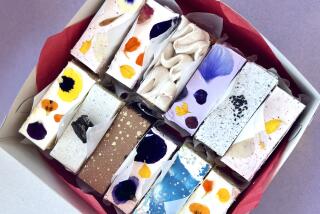Mooncake becomes the fruitcake of China
- Share via
Reporting from Beijing — Zou Jin has one response to the gifts of mooncakes that piled up on her desk before the mid-autumn festival: “You shouldn’t have.”
The 30 cakes that Zou had received from her employer and various clients weeks ago sat unopened and neglected under her desk as the 31-year-old marketing manager tried to pawn them off on anyone who would take them.
“They’re too sweet and not healthy,” she said. “I just bring them with me when I meet friends and give mooncakes to anyone who wants one.”
According to custom, one is supposed to eat the cakes under the full moon on the 15th day of the eighth lunar month, which this year falls on Monday. Often extravagantly expensive, they are about the size of a hockey puck and just as dense. Fillings range from red bean with salted egg yolks to cheesecake to Peking duck.
Back in the era of scarcity, they were a rare calorie-rich treat to fill the chronically hungry belly. Nowadays, the mooncake has become the Christmas fruitcake of China, passed around and regifted ad infinitum.
A typical 6.3-ounce mooncake has about 800 calories. By contrast, a McDonald’s hot fudge sundae, which weighs the same, has only 330 calories.
Last year, health officials in Taiwan warned the public to lay off the mooncakes and instead indulge in fruits and vegetables. But mooncake-haters notwithstanding, nutritionists and dietitians in Beijing doubt that health warnings will dissuade people from eating them.
“Mooncakes have been a traditional part of Chinese food and celebration for centuries, there’s no way we could tell people not to eat them,” said Liu Huali, chairman of the Beijing Nutrition Consultant Assn. “Even though they’re high in sugar, high in oil and high in calories, people won’t listen to our advice.”
Liu said that even he would be eating a few bites of mooncake this year.
For others, though, not only are mooncakes an unwanted gift, insult was added to injury this year when the tax bureau announced that employees who received the cakes as gifts from their company would need to pay income tax based on their value.
This had the side effect of bumping some people into a higher tax bracket. One man at a state-owned petroleum company had to pay an extra $47 in taxes for the month of September because of the gift of mooncakes, the New China News Agency reported.
“As the Western saying goes, nothing is certain but death and taxes. I feel very uncomfortable about the ‘mooncake tax,’” the news agency quoted the petroleum company worker as saying.
In an effort to make mooncakes more palatable, Chinese and foreign companies have started incorporating unconventional flavors. The most popular in recent years have been Haagen-Dazs’ ice cream mooncakes.
“We’ll eat these ourselves, they’re ice cream and delicious,” said Zhang Yujing, 30, a homemaker who was picking up a box that her husband had been given. “But if these were traditional-style mooncakes, I’d give them away as a gift.”
Other Western companies have also gotten in on the mooncake business. Starbucks’ Chinese stores have been selling them since 2005. This year, six cakes cost about $60 and come in a three-tiered box with a separate drawer for each flavor, almost like a jewelry or tackle box.
“Most people just use these as a status symbol, to show they have money,” said a Haagen-Dazs employee who gave only her last name, Li.
The packaging and brand are often more important than the taste or quality of the product. One elaborate package offered by a winery featured a heavy wooden box where each mooncake was individually encased in a round metal container.
Because of the low cost to produce mooncakes and their high selling price, counterfeit mooncakes have cropped up. Last month, police in Guangzhou confiscated 8,000 boxes of mooncakes that had been made to look as if they were from a famous local restaurant.
The high prices commanded by the most prestigious mooncakes have crept even higher in the last year as food prices in China rose across the board. But the big buyers, mostly large state-owned companies, seem unfazed by the price increase.
“Because of inflation, mooncake prices have increased a lot from last year, but we’re actually selling more this year,” said Sparking Lee, general manager at a Beijing mooncake wholesaler.
Lee’s company has sold more than a million mooncakes this year, with the bestseller being Haagen-Dazs. Although he declined to name specific companies, Lee said his largest customers were state-owned telecommunications and technology companies.
Gao G.Z., an executive at a state-owned tobacco company, represents the extravagance of the mooncake economy: A week before the mid-autumn festival, he went to pick up four boxes of Haagen-Dazs mooncakes worth about $140.
“My company gave me all these mooncake coupons, I didn’t pay for any of this myself,” Gao said, gesturing toward his bounty of gifts. “I’d never pay for mooncakes!”
Haas is a news assistant in The Times’ Beijing bureau. Special correspondent Tommy Yang and Times staff writer Barbara Demick contributed to this report.
More to Read
Sign up for Essential California
The most important California stories and recommendations in your inbox every morning.
You may occasionally receive promotional content from the Los Angeles Times.










